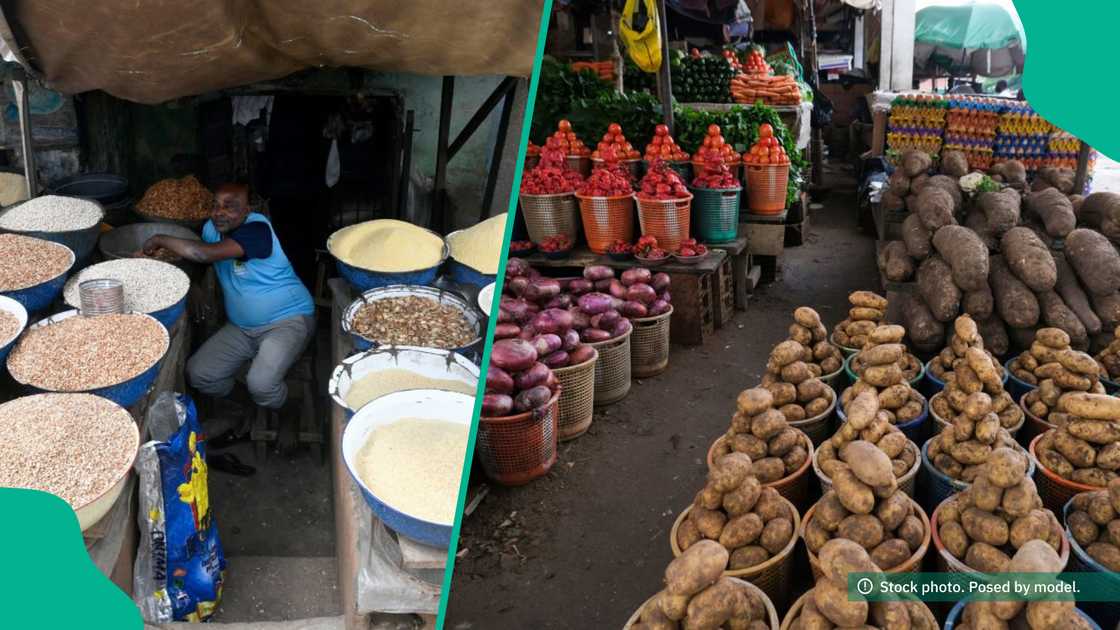Traders Quote New Prices for Beans, Maize, Rice Ahead of Ramadan
- Traders in the northern region have decided to slash food prices ahead of the Ramadan fast set to kick off
- Also, farmers in Borno, Yobe, Taraba, and Adamawa have reported bumper harvests bringing relief to Nigerians
- The National Bureau of Statistics in its rebased consumer price report revealed that food inflation dropped
CHECK OUT: Education is Your Right! Don’t Let Social Norms Hold You Back. Learn Online with LEGIT. Enroll Now!
Legit.ng journalist Dave Ibemere has over a decade of business journalism experience with in-depth knowledge of the Nigerian economy, stocks, and general market trends.
Ahead of the Ramadan fast, traders in states such as Borno, Yobe, Taraba, and Adamawa have reduced their food prices.
The price changes are also attributed to increased local production and a drop in bulk purchases by middlemen.

Source: Getty Images
A survey conducted by BusinessDay revealed that key food commodities, including millet, maize, beans, sorghum, and peanuts, have dropped by as much as 30% in various markets.
In Potiskum, Yobe State, the price of a 100kg bag of millet has fallen from N80,000 to N60,000, while red beans, previously sold for N120,000, now cost N90,000.
Similarly, in Damboa, Borno State, the price of maize has declined from N54,000 to N40,000, while soybeans dropped from N40,000 to N32,000.
Why have food prices changed?
The report noted that price reductions are largely due to government-backed agricultural initiatives.
In Borno State, Governor Babagana Zulum provided logistics support, including free transportation, farm inputs, and security for farmers through an agro-ranger special squad.
In Yobe State, Governor Mai Mala Buni invested heavily in mechanized farming, offering tractors and subsidized farm inputs to boost productivity.
Traders in Maiduguri confirmed that the reduction in prices was driven by decreased middlemen intervention. "We now go directly to the farmers in local markets, cutting out middlemen who previously bought in bulk and controlled pricing," said Abubakar Kois, a trader in Maiduguri Market.
Some food prices increase
However, while grain prices have fallen, yam and cattle prices have surged. In Adamawa’s Ganye Yam Market, the cost of 100 tubers of yam has soared from N70,000 to N80,000 to N200,000, while a single tuber now costs between N1,000 and N2,000, compared to N500 to N1,000 previously.

Read also
Multichoice set to review DSTV compact subscription from N15,700 to N19,000, other packages to be affected
Cattle prices have also skyrocketed, with a cow now selling for between N700,000 and N1 million, up from N300,000 to N400,000 three years ago.

Source: Getty Images
Food inflation drop
The National Bureau of Statistics (NBS) released the first rebased Consumer Price Index (CPI) report recently.
According to the new report Nigeria’s food inflation rate in January 2025 is down to 26.08%, from the 34.8% reported for December 2024.
BoI's new app to check food prices
Earlier, Legit.ng reported that the Bank of Industry (BOI) launched a new app and website to monitor food prices.
The platform BOI said will provide real-time updates on food prices across eight states in Nigeria.
The industry bank also believes that the app will increase transparency and help Nigerians make informed purchasing decisions when buying food items.
PAY ATTENTION: Сheck out news that is picked exactly for YOU ➡️ find the “Recommended for you” block on the home page and enjoy!
Source: Legit.ng



